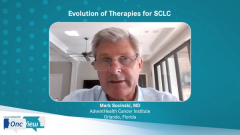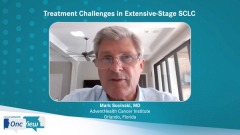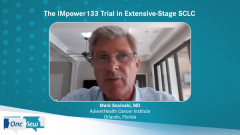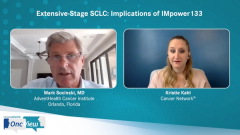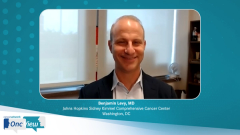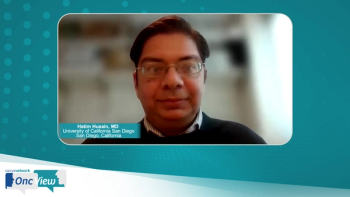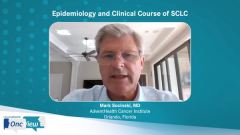
Extensive-Stage Small Cell Lung Cancer: Gaps in Treatment
An overview of current gaps in treatment for patients with extensive-stage, or metastatic small cell lung cancer.
Episodes in this series

Kristie Kahl: I want to switch gears to the extensive-stage small cell lung cancer. How is extensive-stage disease defined, and how does it differ from metastatic small cell lung cancer?
Benjamin Levy, MD: Extensive-stage small cell lung cancer is metastatic small cell lung cancer. That’s important. There are only 2 stages of small cell lung cancer, limited stage and extensive stage, and these 2 can be used interchangeably. All extensive stage means is that the tumor is outside the field where you can get the entire tumor within a radiation field. Commonly, patients come in with bone metastases, brain metastases, liver metastases, or adrenal gland involvement. These 2 terms are used interchangeably.
Kristie Kahl: What percentage of patients first present with extensive-stage small cell lung cancer?
Benjamin Levy, MD: Unfortunately, roughly 75% to 80% of all patients with small cell lung cancer are extensive stage. That’s unfortunate because the goals, at the point when a patient is extensive stage, are palliation and not cure. That doesn’t mean we shouldn’t treat these patients, but we need to have honest conversations with them about what the intent of therapies are. Eighty percent of patients are extensive stage. I will tell you that in my practice, most, if not all, of my patients with small cell lung cancer are extensive stage.
Kristie Kahl: What are the challenges specific to treating this stage of disease?
Benjamin Levy, MD: Yeah, this was touched upon in 1 of the last questions. The challenges of extensive-stage small cell lung cancer relate to small cell. Unfortunately, when this presents, No. 1, it’s outside the lung. It’s in multiple areas of the body that can cause havoc on patients. It can really impact their quality of life, cause pain, and cause neurological symptoms if they have brain metastases. This is a tumor that is extraordinarily complex biologically. Its tumor microenvironment can be hostile, and it has a proclivity to metastasize very early. All these factors make it really difficult to treat. The other challenge is that, while chemotherapy works for extensive-stage small cell lung cancer and immunotherapy works for extensive-stage small cell lung cancer, small cell lung cancer is Darwinian in nature. It wants to survive, and it has a lot of resistance mechanisms that make it resistant to the treatment that it was initially responsive to.
Kristie Kahl: What is the prognosis for patients at this stage?
Benjamin Levy, MD: Unfortunately, even with the advent of immunotherapy, the prognosis is still poor. You’re looking at survival times of 10 to 12 months, maybe a little higher, 13 months in some of the studies. I try to never assign a number to a patient when they come in. They ask questions about this. We have to be balanced and say, “Let’s see how you do.” We know that there are outliers that do very well with chemotherapy or immunotherapy. Unfortunately, the prognosis is that you can’t cure these patients, and the survival time is usually anywhere from 10 to 13 months.
Kristie Kahl: What are the unmet needs in this patient population?
Benjamin Levy, MD: There are many unmet needs. We need additional therapies for this patient population. We need a better understanding, genomically, of what’s going on. We’ve done such a fabulous job in non–small cell lung cancer discovering and elucidating the genomic underpinnings of the tumor, and we haven’t made a lot of forward progress yet. We’re getting there with small cell. We have a better understanding of the genomic underpinnings, tumor microenvironment, and how to leverage therapies, immunotherapies, and other novel therapies to improve the outcomes. With non–small cell lung cancer, there’s a list of things on the horizon that we know are going to get approved in the next 6 or 12 months. There are probably 4 or 5 drugs in non–small cell lung cancer that, I can tell you right now, are probably going to be approved by January 2022. I cannot do the same in small cell. That just tells you how aggressively complex this tumor is and how challenging it can be to treat.
Transcript edited for clarity.
Newsletter
Stay up to date on recent advances in the multidisciplinary approach to cancer.


